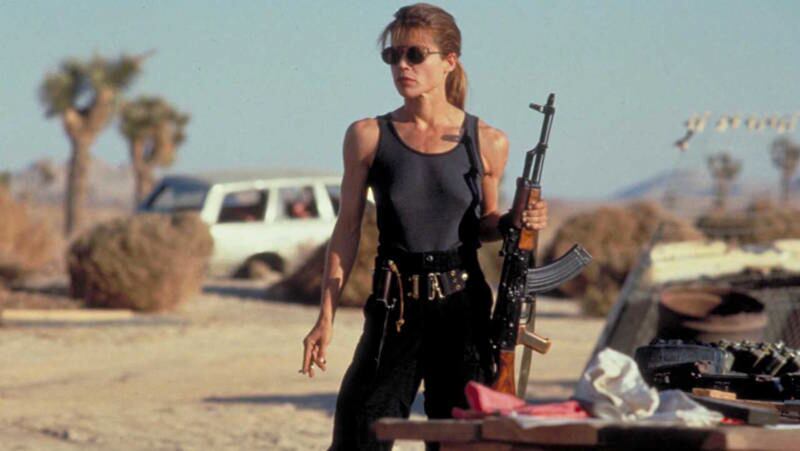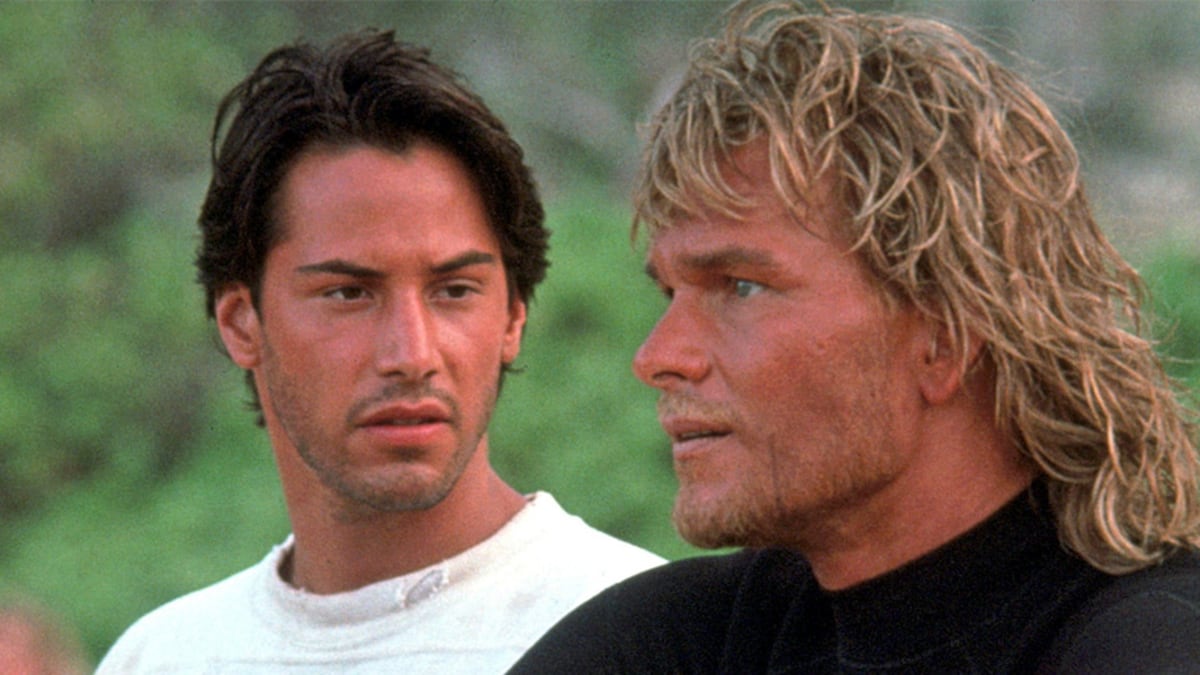In 1988, Bruce Willis and director John McTiernan turned a Los Angeles skyscraper into a warzone in Die Hard, a brutal blast of jubilant chaos that made them movie gods.
Yet behind the film’s daring mayhem was a panicked narrative about big government, globalization and feminism destroying the American nuclear family—which could only be saved by a hot-blooded heterosexual male in a tank top.
A master class in wild yet disciplined action filmmaking, Die Hard should be judged on both its artistic merits and its ideological toxicity. Yet the film’s far-right fearmongering demanded a cinematic response—and it received two from Kathryn Bigelow and James Cameron.
Released in July 1991, Bigelow’s Point Break and Cameron’s Terminator 2: Judgment Day, both of which screen at the Hollywood Theatre this weekend, assault everything Die Hard venerates, including tough-on-crime political grandstanding and patriarchal gender roles.
While it’s doubtful that Bigelow and Cameron, who divorced the same year their respective films were released, were responding directly to Die Hard, they offered a clear philosophical alternative, bringing progressive firepower to the action genre.
Set years after the first Terminator (1984), Terminator 2 introduces us to John Connor (Edward Furlong), who is caught between two terminators—a benevolent T-800 (Arnold Schwarzenegger) and a sinister, shapeshifting T-1000 (Robert Patrick).
When the T-1000 first appears, he kills an LAPD officer and mimics his appearance. Countering the proto-Blue Lives Matter posturing of Die Hard, Terminator 2 immediately associates police work with barbarism, foreshadowing a later scene in which cops pose almost as dire a threat to John as the T-1000.

If Terminator 2 degrades law enforcement, Point Break rejects it completely. Bigelow’s protagonist, Johnny Utah (Keanu Reeves), may be an “F-B-I AGENT!” (to quote the inimitable Reeves), but he questions the validity of his profession after going undercover with a gang of bank-robbing surfers (!) led by the mystical Bodhi (Patrick Swayze).
Johnny eventually tracks Bodhi to Bells Beach in Australia, where he’s about to surf into a likely lethal “50-year storm.” Yet rather than arrest Bodhi, Johnny lets him become one with the waves, tossing his FBI badge into the ocean.
By now, Bigelow has cast aside Johnny’s love interest, Tyler (Lori Petty). Point Break lacks the romantic coziness of Die Hard, which reunites Willis’ John McClane with his estranged wife (although they divorce later in the series). What matters to Bigelow is Johnny, Bodhi and the freedom their bond represents.
Terminator 2 is equally leery of anything that could be characterized as domestic bliss. After John’s foster parents (whom he dismisses as “dicks”) are slain by the T-1000, he turns to his mother, Sarah Connor (Linda Hamilton), who puts the infrequent heroics of Bonnie Bedelia’s Holly Gennaro McClane to shame.
Nothing—not bullets, not blades, not the walls of a psych ward—can stop Sarah. In a film filled with indelible images, nothing is more memorable than the sight of her battling the T-1000 after she’s been shot, firing again and again as she defies the limits of her battered body to defend her son.
Sarah isn’t perfect—she wouldn’t be interesting if she were—but with a little help from the T-800 (who becomes a beloved robo-uncle to John), she helps her son grow into a capable young man. He doesn’t have a father or even a permanent home, but he has her, which makes Terminator 2 a moving ode to single parenthood.
Today, it’s hard to find a blockbuster as proudly liberated as Point Break and Terminator 2. In 21st century action films, it’s so hip to work for The Man that even the Fast & Furious gang ditched their carjacking street cred to become de facto government agents.
It’s equally rare to find a modern big-budget movie as besotted with marriage and parenthood as Die Hard. Tony Stark and Wolverine were both killed off as soon as they became fathers—and, apparently, Eon Productions would rather James Bond perish in a missile strike than raise a daughter.
Was Die Hard a prophecy of Trumpism? Did Point Break, and Terminator 2 preview elements of contemporary progressivism? Maybe. But now that the action genre tends to be populated by largely sexless characters, all three films provoke nostalgic yearning.
Which is all the more reason to see Point Break and Terminator 2 on the big screen, and to recognize that Die Hard has one semi-wholesome message: If you have to sell your soul to the establishment, you may as well get laid and have kids while you’re doing it.
SEE IT: Point Break and Terminator 2: Judgment Day play at the Hollywood Theatre, 4122 NE Sandy Blvd., 503-493-1128, hollywoodtheatre.org. Point Break: 3 pm Sunday and 7 pm Monday, May 29-30. Terminator 2: 6 pm Sunday, May 29. $8-$10.
